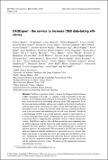DAQExpert the service to increase CMS data-taking efficiency
Author(s)
Paus, Christoph
DownloadPublished version (622.0Kb)
Publisher with Creative Commons License
Publisher with Creative Commons License
Creative Commons Attribution
Terms of use
Metadata
Show full item recordAbstract
<jats:p>The Data Acquisition (DAQ) system of the Compact Muon Solenoid (CMS) experiment at the LHC is a complex system responsible for the data readout, event building and recording of accepted events. Its proper functioning plays a critical role in the data-taking efficiency of the CMS experiment. In order to ensure high availability and recover promptly in the event of hardware or software failure of the subsystems, an expert system, the DAQ Expert, has been developed. It aims at improving the data taking efficiency, reducing the human error in the operations and minimising the on-call expert demand. Introduced in the beginning of 2017, it assists the shift crew and the system experts in recovering from operational faults, streamlining the post mortem analysis and, at the end of Run 2, triggering fully automatic recovery without human intervention. DAQ Expert analyses the real-time monitoring data originating from the DAQ components and the high-level trigger updated every few seconds. It pinpoints data flow problems, and recovers them automatically or after given operator approval. We analyse the CMS downtime in the 2018 run focusing on what was improved with the introduction of automated recovery; present challenges and design of encoding the expert knowledge into automated recovery jobs. Furthermore, we demonstrate the web-based, ReactJS interfaces that ensure an effective cooperation between the human operators in the control room and the automated recovery system. We report on the operational experience with automated recovery.</jats:p>
Date issued
2020Department
Massachusetts Institute of Technology. Department of PhysicsJournal
EPJ Web of Conferences
Publisher
EDP Sciences
Citation
Bardaro, et al. 2020. "DAQExpert the service to increase CMS data-taking efficiency." EPJ Web of Conferences, 245.
Version: Final published version